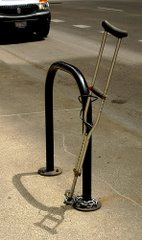A few years ago I spent some time working on a program to teach kids about disabilities. One of the things that has stayed with me the most was a lesson we learned from educators: be wary of teaching about disabilities through experiential tactics. When you blind-fold a kid and tell them to walk around, they learn that it is really hard to be blind. But those short lessons mostly reinforce the negative thoughts we have about the disabled, how life is much harder, more difficult, maybe even pitiful. While it is good to learn that disabilities make life harder in many respects, that is an incomplete lesson. People with disabilities learn new ways to interact with the world, and I doubt that those lessons can be taught without necessity.
I say all these things to give some context to video posts about people with disabilities such as the one I recently posted here about Frozen Pizza and this one about going grocery shopping. I believe that these films were made to illustrate that having a disability makes simple things in life very laborious. That is true, and it's hard not to get that impression from these films.
But an initial able bodied perspective of these videos may be incomplete. For the people in these films, this is their way of life. They have adjusted to use the abilities thy have. I'd be willing to go out on a limb and say that their lives are not all pain and difficulty. While that may not be the lesson the videos are trying to teach, it is an important thing to keep in mind.
ABLED
This blog is about reconciling the two worlds of disability understanding. On one side are the strong voices of activists in the disability community. On the other is the well meaning but naïve/ ignorant able bodied population who see disability as something pitiable. As an able bodied person who has realized the very compelling and interesting arguments about society and life coming from the disability community, I am compelled to referee the exchanges between the two sides. Often times it seems that everyone is speaking so loudly and with such great conviction that the other doesn't even listen. Since I am not personally motivated by either side, I can weigh both sides of the arguments and hopefully facilitate an open and accepting space for both sides to express themselves and learn about each other. Please join the discussion!
Subscribe to:
Post Comments (Atom)

1 comment:
In college, I became good friends with a quadrapolegic named Kathleen. We had a class together, and as the professor couldn't always understand what she was saying - I would interpret. This grew into a relationship where I finally felt comfortable asking about her disability, "being bound to the motorized wheelchair" as I put it.
To my surprise, she was overjoyed to be in the chair! She cherished her freedom; it allowed her to experience the world in a whole new way - she didn't want pity or sympathy. She was an intelligent woman who wanted to be heard and contribute to the class. And boy did she!
Post a Comment